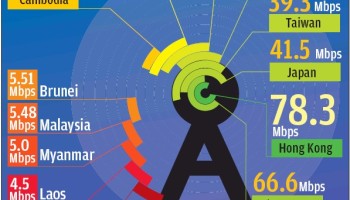https://youtu.be/4bhexUMxO0w
China tycoon to invest RM10b in Malaysia
Yan Jiehe says country is business friendly, with strong fundamentals
China’s Pacific Construction Group Ltd (CPCG) gave Malaysia a vote of confidence with a planned RM10bil investment over 10 years in areas including infrastructure development and hi-tech machinery.

Yan Jiehe (pic), founder of CPCG, which is No. 96th in 2018 Fortune Global 500, said Malaysia “is business friendly, and one of the most competitive countries in the region”.
“The country’s fundamentals are strong. You have excellent infrastructure, a robust eco-system and a big pool of trilingual talents. Kuala Lumpur, is thus, a strategic launch pad for our expansion into Asia Pacific.
“We plan to invest up to RM10bil over 10 years in Malaysia in line with our core business areas of infrastructure development, hi-tech machinery and education,” he said in a statement.
Yan also said CPCG was open to increasing its investment especially for federal projects that would benefit the people.
“With our track record of having successfully delivered complicated construction projects in China, we are confident that, in collaboration with local partners, we will be able to do the same in Malaysia,” he said.
The group, in a move to make it easier to invest in Malaysia and across Asia Pacific, CPCG has set up CPCI Holdings Sdn Bhd, a wholly-owned subsidiary in Kuala Lumpur as its regional technical competency centre.
CPCI is involved in a RM200mil construction project in Sahabat, Sabah.
“Within the next five years, we plan to employ 150 highly skilled professionals of which more than half will be Malaysians as we position CPCI as a major player across the Asia-Pacific region. These trilingual local talents will be invaluable to work on the group’s projects worldwide,” Yan added.
With CPCI, the group would be able to optimise its operations by centralising its regional decision-making and key activities in Kuala Lumpur including accounting, strategic business planning, business development, bid and tender management, as well as engineering services.
Under its education strategy, CPCI plans to set up business schools and universities, and provide scholarships to local students. As a start, CPCI will provide up to 500 scholarships for construction and engineering students in local universities.
On the group itself, CPCG had a total revenue of RM319bil and it is the biggest private-owned construction company in the world. Founded in 1995 by Yan, CPCG was named as one of the Top 500 Chinese enterprises. It is one of the largest integrated construction groups in China and Asia in terms of the total engineering contract revenue. - The Star
ADB Panel debunks ‘debt trap’ concerns
'Belt and Road Initiative not out to cause hardship to recipients'
KUALA LUMPUR: The Asian Development Bank (ADB) and two China watchers do not believe that China is using its Belt and Road Initiative (BRI) to practise debt diplomacy and causing hardship to recipient nations.
“I don’t buy the notion of China practising debt diplomacy. It is not a sustainable model.
“I don’t think this is the objective of the Chinese government in launching the BRI,” said ADB vice-president Stephen Groff.
Groff told a regional China Conference here yesterday that the failure of some BRI recipient countries to repay loans was due to their “lack of capacity”.
China’s ambitious BRI, which spans more than 65 countries, has given rise to criticism that it will drag developing countries into debt they cannot repay.
Malaysia recently cancelled several projects, saying it could not afford to implement them.
Reminding accusers of China to adopt an evidence-based approach, Groff said countries should look at their capacity when coming to the negotiating table.
At the same panel discussion on “Avoiding Belt and Road debt trap”, Prof Dr Belal Ehsan of International Centre for Education in Islamic Finance said China’s BRI had played an important role in infrastructure investments in Asia.
“Every country in the world is corrupt. It is a question of degree. China now needs a new financial architecture for BRI.
“It cannot be debt-driven but risk-sharing and profit-sharing (like Islamic financing) so that no one is a loser in the end,” he said.
Describing the “debt trap” as a concoction of Western governments and media, chief economist of IQI Global Shan Saeed said: “The rise of China is inevitable, whether you like it or not.
“The US government, media and people do not understand history and culture.
“China has 5,000 years and US only 250.
“In the Western world, everything about China is bad. The time has come for us not to listen to the Western media and be dictated by Western policies.”
To reduce risk in BRI projects, Saeed proposed loans be denominated in local currency or yuan, and not in the US dollar.
ADB believes that adopting transparency and international standards in financing will also help nations reduce risk.
“Institutions have learnt from experiences in the 1990s on debt problems.
“It has taught us the importance of transparency and sustainable framework,” said Groff. - The Star by Ho Wah Foon
Related:














